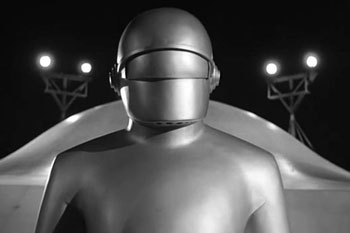
LA Times Editorial
Presented with a more truthful version of history, visitors to the Nixon Library's new exhibit on the Watergate scandal can make their own judgment on the Nixon presidency.
April 06, 2011
The easy thing to say about the new, updated and improved Watergate exhibit at the Nixon Presidential Library and Museum in Yorba Linda is that it is about time. For years, the library — funded and run until recently by private donors and loyalists of the former president — maintained a self-serving, oh-really-it-wasn't-so-bad exhibit designed to portray the scandal as a series of presidential misjudgments followed by a "coup" to run Richard M. Nixon out of office.![]()
The burglary? Nixon knew nothing about it. The 18 ½-minute gap on the tape? It could easily have been caused by a mechanical malfunction. The investigation? Politically motivated.
The text of the display was written by a former Nixon assistant who wanted viewers to "walk away from it shaking their heads, wondering how the nation ever let such a great president be taken away from them." Nixon himself approved the exhibit, pronouncing it brilliant.
Thankfully, it is now gone, replaced last week by a new, less one-sided version installed by the library's current director, Timothy Naftali. That's fitting, because the institution is no longer private but is under the control of the National Archives, and whitewashing history at taxpayer expense would be particularly inappropriate.
The truth, as most historians now acknowledge, is that the Nixon administration showed a brazen disregard for the Constitution and the rule of law, from the break-in at Daniel Ellsberg's psychiatrist's office to the burglary of Democratic headquarters at the Watergate hotel to the effort to use the IRS to punish political opponents to the creation of a political enemies list.
But history is nuanced and complex. Now that the basic facts about Watergate have been acknowledged at the Nixon Library — without exaggeration or soft-pedaling — visitors can reach their own conclusions about Nixon's broader legacy. Some may think his groundbreaking visit to the People's Republic of China or his years struggling against communism in the U.S. or his resolution of the Vietnam War outweigh Watergate in importance. Some may be horrified by his racist and anti-Semitic comments on the White House tapes, while others may shrug them off as the prevailing attitudes of men of his age at the time.
In all the brouhaha over the exhibit, we most admired the comments of John Taylor, a longtime Nixon aide who ultimately concluded that it should go up. "If we're really sure the president over time will be seen as the great president some of us believe he is, we can't be afraid of what someone might say that's critical," Taylor said.
Good for him. Let history judge, based on the facts.


